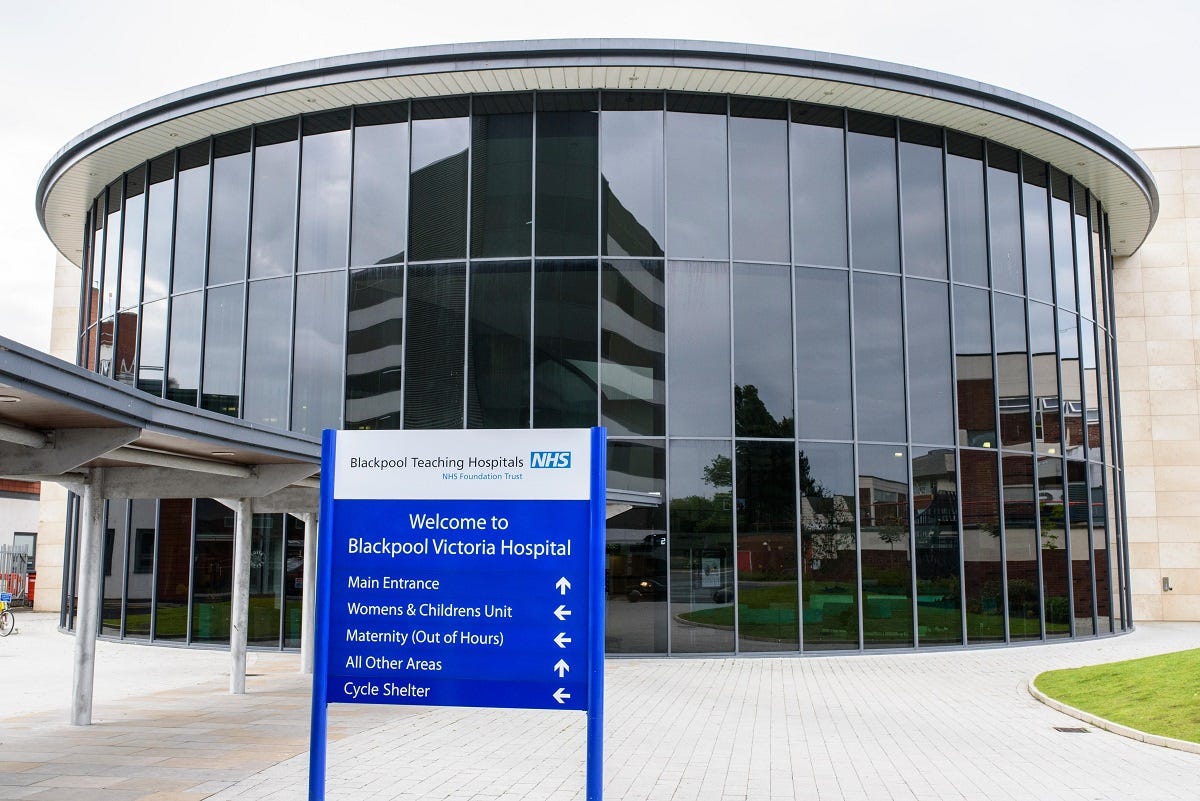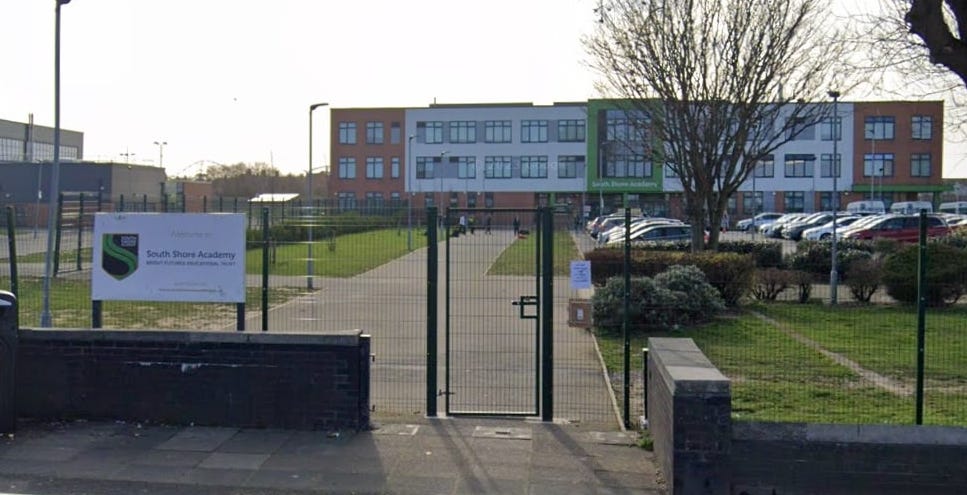Independent review underway at Blackpool Victoria Hospital as concerns raised over fetal medicine service
PLUS: Poor performance at one Blackpool school
Hello and welcome to the weekend edition of The Blackpool Lead.
Today we continue our series looking at Blackpool Victoria Hospital, under new leadership but with plenty of problems it needs to resolve.
We’ve covered the topic extensively since our launch and have a commitment to continue to do so.
We also look at a report into secondary school performance in Blackpool which concluded that most of the town’s secondary schools are well-below the national average.
That’s problematic for Blackpool Council, who do not have the same level of power to instigate change in schools as their counterparts at Lancashire County Council.
In future editions, we look forward to rolling out some exclusive, and additional, high-quality writing that will be made available to paying subscribers.
This will be focusing on history and culture in Blackpool - we have a commitment to keeping our newswriting free for readers.
You can best support our work, however, by taking a paid subscription. You can rest assured that any investment made by readers will be spent on providing more journalism - and greater scrutiny of bodies like Blackpool Council and Blackpool Teaching Hospitals.
Concerns over service which provides care for unborn children and their mothers
By Michael Holmes
An independent review is being carried out at Blackpool Victoria Hospital after concerns were raised about its new fetal medicine service, which provides care for unborn children and their mothers, The Blackpool Lead can reveal.
It comes after several so-called “rapid reviews” - investigations into potential causes for concern - with “similar emerging themes” related to the service, including ultrasound scanning and preterm clinical pathways, identified.
The probe is expected to take 12 weeks to complete and is being led by Leo Gurney, a consultant obstetrician and expert in fetal and maternal medicine from Birmingham Women’s Hospital.
Chris Barben, executive medical director at Blackpool Teaching Hospitals NHS Foundation Trust, which runs the Vic, said: “The fetal medicine service was established … less than a year ago with a small specialist team.
“As part of our routine best practice, we carry out reviews where they may be necessary…
“It’s not unusual to call on specialist peers to support this, particularly in a small service.
“Further information will be shared publicly once the review has been carried out and it’s important to note that we are looking to expand the service to help support patients in this specialist area of medicine.”
The trust did not say, when asked, what was meant by “emerging themes” or what specific issues were identified.
It also did not say what, if any, impact there was on patient outcomes or care.
Nor did it say how the concerns raised in the rapid reviews were identified - whether through patient feedback, clinical audits or some other way.
In September, The Blackpool Lead reported that an investigation was opened after a “never event” - so called because they should never happen - saw a medical swab designed to stop bleeding left inside a woman after she gave birth.
It happened a month earlier and is not thought to be linked to the concerns that have prompted Gurney’s review.
And in August, The Blackpool Lead revealed how Vic medics failed to properly examine a heavily pregnant patient before inappropriately giving her a drug to help with contractions.
The error, admitted by hospital bosses, is feared to have sparked complications for the mother-to-be’s baby, who was blue, floppy and not breathing when he was born.
It led to a court case, which ultimately saw a judge rule that there was not enough evidence to prove the boy’s traumatic birth is behind a range of medical issues.
The legal row erupted during a period of scandal and scrutiny in maternity care and at the hospital, which has been rocked by several controversies in recent years, including a poison plot by rogue staff on the stroke ward and the unsolved murder of a grandmother.
The Vic’s maternity unit, which delivers around 3,000 babies a year - an average of just over eight a day - was rated “requires improvement” after its last inspection by the Care Quality Commission (CQC), the hospitals watchdog, in 2022.
The inspection, which was unannounced, was carried out “partly” because of “concerns raised over how the service was managing with low staffing to ensure women and babies received safe care and treatment”, the CQC’s report said.
It said “serious concerns” were uncovered, including “ineffective processes to manage and mitigate the risks in relation to the lack of enough suitably qualified midwifery staff to care for women”, which were “contributing to significant risks to women receiving timely and appropriate care and treatment, exposing them to the risk of harm”.
The CQC’s report, which did say the Vic had come up with an action plan to try and improve, added: “Staff did not always provide effective care and treatment and did not always meet expected patient outcomes.”
Marie Forshaw, the hospital’s acting executive director of nursing, midwifery, allied health professionals and quality, said last year that the “safety of mothers and their children is of utmost importance to all of us” and, since the CQC’s inspection, bosses have “worked hard to make significant improvements”.
Gurney, the doctor leading the independent review, is described on the West Midlands Children’s Network website as “the consultant lead for fetal medicine at Birmingham Women’s Hospital”.
It says he trained in the north east before moving to the West Midlands to “complete subspeciality training in maternal and fetal medicine”.
“He has a clinical interest in high-risk maternity care and fetal interventional procedures,” it adds.
A CQC spokesperson said the regulator is aware of the Vic's investigation but not involved.
The Department of Health and Social Care did not respond when asked if it was involved.
We’re delighted to say Cosy Homes in Lancashire is supporting independent, in-depth journalism in Lancashire by sponsoring The Blackpool Lead and The Lancashire Lead. Discover how they can help you improve energy efficiency in your home and keep it warmer.
Catch up on our big story from mid-week
New figures show huge disparity in education levels in Blackpool
By Shelagh Parkinson
Fewer than one in 10 pupils at a Blackpool school passed at least five GCSEs including English and maths last year, shock new figures have shown.
The figure is well below the national average of 45 per cent and also reveals a huge gap between the performance of secondary schools in the town, with St George’s School in Marton easily the best performing school.
Its exam results show seven out of 10 pupils achieved at least five GCSEs including English and maths. All the other secondary schools in Blackpool achieved results below the national average, prompting alarm among council education chiefs.
The next best performing school was Highfield where 30 per cent of pupils passed at least five GCSEs including English and maths (compared to the national average of 45 per cent), while 51 per cent of pupils at St Mary’s passed at least four GCSEs including English and maths (national average 64 per cent).
St George’s was also the only secondary school with a positive Progress 8 figure – which measures the progress pupils make from Key Stage 2 in primary school up to the end of their GCSEs in Key Stage 4.
The figures were presented to a meeting of the council’s Children and Young People’s Scrutiny Committee as part of a report which said most of the town’s secondary schools were performing “well below national averages”.
The report added: “The Progress 8 scores are particularly concerning with a wide range of outcomes for children in Blackpool depending on which school they attend.”
The meeting was told the council has fewer powers as all Blackpool’s secondary schools are run by academy trusts.
Graeme Dow, assistant director for education at the council, said the results for South Shore Academy were “a shock” and added: “We need to find the opportunity to have a greater dialogue with schools but getting our foot through the door isn’t easy.”
He said he wanted schools to learn best practice from achievements at St George’s, but the meeting also heard there were many factors which could impact school achievement.
These included the high number of pupils being expelled, transience which meant youngsters regularly changed school and parental factors such as parents being out of work or suffering mental health issues.
Mr Dow said education was now being instilled into Blackpool’s regeneration programme.
He said: “We have to ask, do we have a curriculum which meets what our town needs and what our pupils need? In a lot of cases of exclusion we look at alternative learning environments and sometimes these are more inspiring to some of our pupils.”
The meeting heard South Shore Academy has now been taken over by Cidari, which is the Blackburn Diocese multi-academy trust which already runs St George’s School.
South Shore was put into special measures after being rated inadequate following an Ofsted inspection in June 2023. A further Ofsted inspection in June 2024 found some improvements but said more work needs to be done.
Percentage of pupils passing at least four GCSEs including English and maths – Armfield 38 per cent; Aspire 38 per cent; Highfield 45 per cent; Montgomery 38 per cent; South Shore 20 per cent; St George’s 83 per cent; St Mary’s 51 per cent; Unity 24 per cent.
Percentage of pupils passing at least five GCSEs including English and maths – Armfield 22 per cent; Aspire 24 per cent; Highfield 30 per cent; Mongomery 21 per cent; South Shore nine per cent; St George’s 70 per cent; St Mary’s 28 per cent; Unity 12 per cent.
The best things to do in Blackpool from 27 January...









